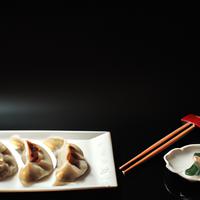
1 serving (50 grams) contains 80 calories, 3.0 grams of protein, 2.5 grams of fat, and 10.0 grams of carbohydrates.

Log this food in SnapCalorie

Nutrition Information
Calories |
381.0 | ||
|---|---|---|---|
% Daily Value* |
|||
| Total Fat | 11.9 g | 15% | |
| Saturated Fat | 2.4 g | 12% | |
| Polyunsaturated Fat | 0 g | ||
| Cholesterol | 23.8 mg | 7% | |
| Sodium | 952.4 mg | 41% | |
| Total Carbohydrates | 47.6 g | 17% | |
| Dietary Fiber | 2.4 g | 8% | |
| Sugars | 4.8 g | ||
| protein | 14.3 g | 28% | |
| Vitamin D | 0 mcg | 0% | |
| Calcium | 47.6 mg | 3% | |
| Iron | 2.4 mg | 13% | |
| Potassium | 238.1 mg | 5% | |
* Percent Daily Values are based on a 2,000 calorie diet. Your daily values may be higher or lower depending on your calorie needs.
Food Attributes
Source of Calories
About Boiled gyoza
Boiled Gyoza, a staple of Japanese cuisine, is a tasty dumpling made from thin, chewy flour wrappers filled with finely chopped ingredients. Typical fillings include ground meat (commonly pork or chicken), cabbage, garlic, ginger, green onions, and a fragrant blend of seasonings like soy sauce and sesame oil. Unlike the pan-fried version, boiling gyoza skips the added oil, making it a lighter preparation. Nutritionally, boiled gyoza offers protein from the meat and fiber from the vegetables, along with vitamins and minerals from ingredients like cabbage and ginger. However, it can be high in sodium due to the soy sauce-based seasoning. Pairing boiled gyoza with a lighter dipping sauce or complementing it with nutrient-rich side dishes can enhance its dietary balance. Popular for its savory taste and comforting texture, this dish exemplifies how simplicity meets flavor in Japanese culinary tradition.



